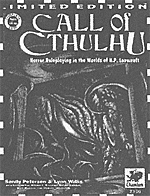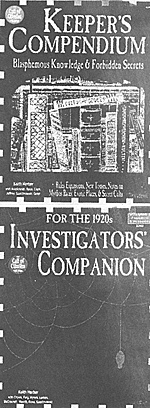 How in the world do you review Call of
Cthulhu? After all, everybody in the gaming
industry knows exactly what Cthulhu is all
about.
How in the world do you review Call of
Cthulhu? After all, everybody in the gaming
industry knows exactly what Cthulhu is all
about.
Or do they?
When I asked a friend of mine what he thought of CoC, he put it in very precise terms. "I don't like it because there's no way to win. You have to go against gods, man. There's no chance. No hope. All you can do is hope to drive them away for a while before they come back, and what the hell kind of fun is that?"
That's when I asked him if he'd ever played the game before. "Uh - no. I mean, if I don't like the premise, then why even try playing the game?"
My friend had a very good point that I won't even try to argue. If you're not into science fiction, you don't play Traveller. If you don't like high heroic fantasy, you don't play D&D. The problem is that most people don't know the premise of Call of Cthulhu. They hear what other people tell them what the game is about, and before they even try it out, they've already got a bad first impression that will mark them for life.
 So right here, I'm going to try and break
that whole misconception of what Cthulhu is all
about so you'll have the right impression. Yeah,
it's a mean, cold horrific world, but there's so
much more that you're missing out on. Come on,
let's take a look at where this big monster called
Cthulhu comes from, and once you know his
history, he won't be so scary anymore.
So right here, I'm going to try and break
that whole misconception of what Cthulhu is all
about so you'll have the right impression. Yeah,
it's a mean, cold horrific world, but there's so
much more that you're missing out on. Come on,
let's take a look at where this big monster called
Cthulhu comes from, and once you know his
history, he won't be so scary anymore.
Call of Cthulhu is a role-playing game of fantastic horror based on the works of Howard Phillips Lovecraft. "The Old Man of Providence" was a prolific writer who published most of his work in a small press magazine called Weird Tales back in the '20s and '30s.
His stories usually focused on the small town of Arkham, MA and involved the students and professors of Miskatonic University who did battle with an alien race of incredible power called "The Great Old Ones." So unfathomable was their might, that their science was like magic to a human's puny mind. Corrupt and insane humans worshiped the Great Old Ones, and the most prolific cult of worship was the Cult of Cthulhu, a giant, squid-like beast who lies in a death-dream state under the Pacific Ocean in his sunken city, waiting for the time when the stars will be right and his city will rise up from the depths and his race will rule the world again. (Whew, that was a mouthful.)
Anyway, Lovecraft generated a small cult following of his own, and when others asked permission to add to Lovecraft's growing pantheon of Great Old Ones, he welcomed them. Soon, authors such as Robert E. Howard (the guy who created Conan the Barbarian), Robert Bloch (author of Psycho), Fritz Leiber (the fellow responsible for Fafhrd and the Gray Mouser), Lin Carter and Ramsey Campbell (if you don't know who they are, you'd better go renew your library card) were all creating their own unspeakable monstrosities and blasphemous books.
Soon, "the Lovecraft Circle" was passing private jokes in the pages of Weird Tales. The young Robert Bloch was kind enough to kill off Lovecraft in one story, and H.P. gladly returned the favor in another. Robert E. Howard mocked the self-important August Derleth by creating and killing off the effete "Compte d'Erelette" while Lovecraft wrote up a bogus "History of the Necronomicon," filled with in-jokes and jabs at his Circle. It was, perhaps, the most prolific "shared universe" the fantasy/science fiction/horror genres have ever seen, and it didn't stop with Lovecrafts untimely death. The Circle kept his memory alive by continuing to write "Cthulhu Mythos" tales while August Derleth and Donald Wandrei created Arkham House, a small press publishing house that published Lovecraft's fiction in a single collection for the first time.
Fifty years passed, and something inexplicable happened. "Real" authors started publishing Cthulhu Mythos stories. Guys like Phillip Jose Farmer, Alan Dean Foster, Harlan Ellison and Stephen King wrote their share of Mythos fiction, some of which was even worthy of publication. (Most Mythos fiction isn't, because authors usually dabble in the Cthulhu Mythos in their youth, and it's published as juvenalia). And that's how the largest shared universe in the literary world was born. Lovecraft started it more than sixty years ago, and its still going strong.
 Now, let's talk about Call of Cthulhu.
Now, let's talk about Call of Cthulhu.
In CoC, you play the role of an Investigator. Game Masters (called "Keepers" which is short for "Keeper of Arcane Lore") usually run scenarios from one of the three "Eras": Cthulhu by Gaslight (1890's), Classic Cthulhu (1920's), or Cthulhu Now (1990's).
A typical Cthulhu game usually feels more like a Sherlock Homes mystery rather than a Tolkien Quest. The Investigation usually begins with a mystery - a dead body, a missing relative, a mysterious death, or the discovery of a mysterious artifact. As the mystery unravels, the Investigators begin stumbling across things that... well, Just don't make sense. Things become more surreal as they strip away the initial veil that keeps Mankind safe from the true nature of a stark, uncaring universe.
Whether it's uncovering a cult of Cthulhu worshippers whose arcane powers defy logical explanation, or the discovery of a small town who is trading unspeakable acts for gold bars from shambling horrors from the sea, a typical Cthulhu adventure can be as sedate or as spectacular as the Keeper wishes to make it.
I've played in Cthulhu Investigations that began with a simple disappearance and ended with the Investigators trapped in a subterranean temple, half of them trying to hold off inhuman cultists while the other half try to set up enough explosives to detonate the place. Contrary to popular belief, tommy-gun shoot-outs and fist fights are not alien to Cthulhu, but those who try and use violence against the malevolent power of the Great Old Ones are going to be in for a bout of disappointment.
The emphasis in Cthulhu is investigation. Putting the puzzle together isn't half the fun, sometimes, it's all the fun. And it creates an interesting dichotomy. After all, if you spend all Of Your Character Points on things like Perception, Investigation, Clue Analysis, and that great Cthulhu Skill Library Use, you've got a character who isn't a combat monster, and when combat with the cultists does come, players really start sweating. Combat isn't scary when you've got a character who knows what he's doing, and playing Cthulhu - all about getting scared, about confronting the unknown with a brave face. Sometimes the battles can be desperate, but when there's hope, no battle is ever futile.
The last thing I'd like to mention about Cthulhu is the supplementary material. I think I can say, without fear of retribution, that Chaosium publishes some of the most thoroughly researched gaming materials on the market. Purchasing a Cthulhu supplement is like purchasing a little encyclopedia. A good example are the 20s Investigator Companions, Vol I & II.
Volume I contains all the information a Cthulhu player and Keeper need if they want to know more about how to run a campaign in the Roaring 20s. It's got information about mundane things that you'd never think about. Headings include: Men's Fashions, Women's Fashions, Sports, National Records, State and Local Records, American Magazines, Buses and Trollies, Taxi Cabs, Driving In America, Everyday Items (just how does a flashlight work in the '20s, Winter Gear, Communication, Climbing Gear, Firearms and the Law, Special Ammunition and (yummy) Submachine Guns.
Volume II includes 140 Occupations for use in the '20s, including special rules for each. It also includes 1920s Skills, Legal Tips, and a whole section on science and forensics. These two books (both listed at $10.95) are invaluable to anyone who plans on running any role-playing game during that Era, which is true with just about anything Chaosium publishes. They put a lot of pride and research in their work, and it shows.
Call of Cthulhu is not a game about futility. It is a game about Mankind fighting desperate battles against horrors that are beyond human comprehension. It's not a game for the meek or timid, those who believe that good always overcomes evil because that's the way it works in all those fancy Tolkien Quest clones.
If you've seen Alien, John Carpenter's The Thing, or The Prophecy (very Lovecraftian angels and devils), then you know exactly what you're stepping into when you play Call of Cthulhu. It's a desperate, deadly battle, but those are really the only ones worth fighting, aren't they?
Back to Shadis #26 Table of Contents
Back to Shadis List of Issues
Back to MagWeb Master List of Magazines
© Copyright 1996 by Alderac Entertainment Group
This article appears in MagWeb (Magazine Web) on the Internet World Wide Web.
Other military history articles and gaming articles are available at http://www.magweb.com